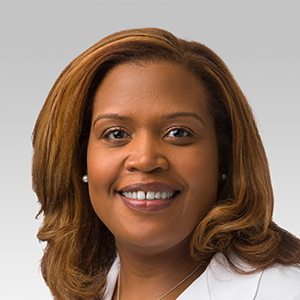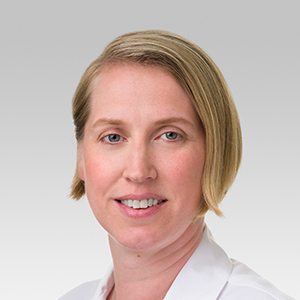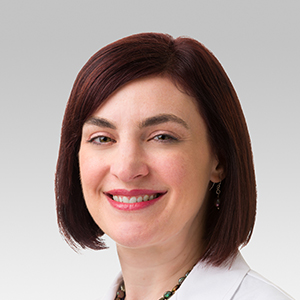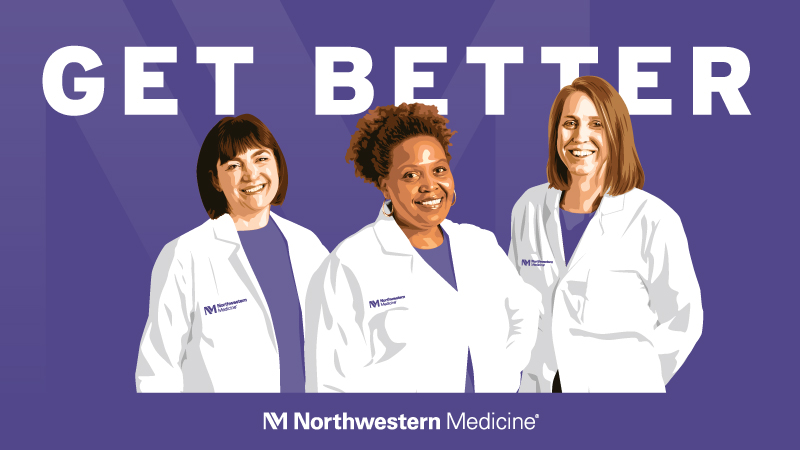SEASON 1 EPISODE 1
Get to Know Your Hosts [Podcast]
Meet the Hosts of the Get Better Podcast
Published February 2022
About this Episode
Khalilah Gates, MD, Michelle Prickett, MD, and Susan Russell, MD, are three Northwestern Medicine pulmonologists who also happen to be best friends. As physicians, they consider themselves lifelong learners, which is why they're launching a podcast to learn more about their health. Get to know these hosts of Get Better, a new podcast that helps you live a healthier and better life from head to toe.
About the Get Better Podcast
Living a healthier life is a journey with no final destination: You can always get better.
Susan Russell, MD, Khalilah Gates, MD, and Michelle Prickett, MD, are three pulmonologists at Northwestern Medicine who help people get better from critical illnesses. They are also lifelong friends and lifelong learners who want to get better from head to toe.
These three physicians will learn alongside you as they interview other Northwestern Medicine experts about health and medicine topics meant to help you achieve better health.
Transcript
Russell [00:00:02] Let's get stronger.
Gates [00:00:04] Healthier.
Prickett [00:00:04] Calmer.
Russell [00:00:05] Smarter.
Gates [00:00:06] Better.
Russell [00:00:07] Living a healthier life is a journey, not a destination.
Gates [00:00:10] You can always get better.
Prickett [00:00:12] Let's get better together.[00:00:19] I'm Dr. Michelle Prickett.
Gates [00:00:21] I'm Dr. Khalilah Gates.
Russell [00:00:22] And I'm Dr. Susan Russell.
Prickett [00:00:24] We're three Northwestern Medicine pulmonary and critical care specialists who also happen to be long standing friends.
Russell [00:00:30] On Get Better, which is part of the Northwestern Medicine HealthBeat blog, we'll be interviewing fellow Northwestern Medicine experts about health from head to toe.
Gates [00:00:39] This podcast is going to offer you fun, new perspectives from women who, like our listeners, are just trying to figure out how to be our better selves. And we can do that with the correct information, with a little laughter, a little tears and a little fun.
Russell [00:00:59] Let's jump in.
Prickett [00:01:00] As most of you guys know, I grew up with athletics and my biggest aspiration was to be an athletic trainer. I had an injury. That's what I wanted to do, and I got to high school and my freshman biology teacher, Mr. Andre Dixon, told me, "you don't need to be athletic trainer, you should aim higher and you should be an orthopedic surgeon." So, I literally on that naively said, "I'm going to go into medicine. I'm going to be an orthopedic surgeon." And I went on that journey having no idea what I was doing and having this image of what doctors were. So here I am. I am not an orthopedic surgeon, bones scare me and I don't like the drills or anything like that, but I love to know how things work. I am so happy at the journey and the path that I've been on. So what brought you guys here?
Gates [00:01:42] I entered medicine having no clue exactly what that meant. When I was six years old, I believe, I declare that I was going to be a physician. That has become a pediatrician, then OB/GYN, and then I saw my first birth and I was like, "oh no, that's not going to work." And then I found my, my love for internal medicine and just taking care of critically ill patients. Did not choose pulmonary critical care medicine, knowing that there would be a pandemic 10 years into my career, but you know, we're still moving, I'm still enjoying medicine. Here we are. And, you know, got to meet the two of you, who have become very important colleagues and friends. And so, medicine, like life, has been a journey and we're still on this journey together. What about you, Russell?
Russell [00:02:35] Well, I did not declare an intention to become a physician until I was in college. My grandfather had Alzheimer's disease, and originally I wanted to be a researcher to help discover bio-physiological answers to disease. I was kind of pursuing that path, and then when I hit college, I realized that science is very fascinating, but I also enjoy a lot of human interaction and the stories behind people and kind of what brings them to where they are today. And so I shifted a little bit towards medicine as opposed to basic science/research. I really was undifferentiated until I hit residency, when I realized that I enjoy the sickest of the sick, having a lot of diversity in patient care, and that kind of led me towards the path in pulmonary and critical care medicine. Still, today, when I do interviews with aspiring doctors and they'll ask me, like why I'm almost a lifer at Northwestern, I say it's because of the great friends that I went to residency and fellowship with, like the two of you. And that's why I'm still at Northwestern to this day.
Gates [00:03:49] That is awesome.
Prickett [00:03:51] I think, I think I have, I've had the same response. People ask me why I'm still here and I'm like, "because all my friends are here." And you know, it's hard to believe, you know Susan and I were interns together, so we had just become doctors. We didn't feel like doctors and we were struggling with what that meant to have that responsibility. And then we get through that and all that comes with this and then we go to fellowship, and that's where we meet the wonderful Dr. Gates, who joined us in our all-girl team, which was not what most critical care was. So, I'm really thankful for having you guys on this journey with me, which is not again what I anticipated, but I'm so happy where we're at and honestly where we're going.
Gates [00:04:31] Absolutely. I still remember that day of fellowship orientation, where I had no clue who you are, but you two knew who I was and you met me down at the stairs, you were like, "Hey, you're with us, let's go!" And we haven't. We've been together since that day. And so it's really been a pleasure to be welcomed into the Northwestern community by the two of you. But then to grow and learn from you and get to know you and call you friends has been one of the joys of this Northwestern experience for me.
Russell [00:05:03] And that's one of the main reasons that I decided to do this podcast. Even though we've been working alongside each other really intensely during the last two years, it would be really nice to step back and talk about things occasionally that are not COVID, with some good friends, so I thought this would be a great opportunity to learn alongside people I like.
Prickett [00:05:25] And I think there's comfort in that, right? Like, I think I went into medicine thinking doctors know everything and I have learned that doctors know what they know and they learn from others. And there's a humility in that and there is an importance of sharing, but there's also an importance of asking. I'm so glad to be here with you all because I think we have that trust of, yeah, if I don't know the answer, I know we're going to find it and we're going to lean on our friends to help us in that journey. So I think this is kind of what I I'm hoping to see out of this podcast is we're just learning together and we're doing it in a safe space where you can ask questions. You can be vulnerable. And again, we can just grow and know that we all grow in our own way.
Gates [00:06:05] And I also think it's going to be fun to take out a group text messages to a larger audience and share the things that we talk about as women, as mothers, as physicians, as people just trying to be our best selves. And I think there's value in sharing at least some of that. Absolutely not all of it.
Prickett [00:06:26] No, not all the text messages. We struggle. We are human. We come from different places. We have a different life lens and different experiences. And I think that's again, that's a benefit to be able to share it openly and honestly. And I hope we can do that with a larger audience.
Russell [00:06:41] A lot of very intense friendships in medicine are formed during residency because usually it's the most intense period where you're working the hardest and you're going through a unique experience with other people. The last two years going through the pandemic, working in the ICU setting and in outpatient pulmonary medicine has been a similar unique, intense experience. There's almost a feeling of isolation within that because you feel like what you are going through nobody else has experienced when that's not true, really. All of us has been going through these things together, and I'm sure we'll talk about it more when we have kind of a dedicated episode to COVID, but part of that intensity, like brings these friendship bonds even closer together.
Prickett [00:07:29] So we have always worked in the intensive care unit, intense as part of what we do and has always been a part of what we've done. This particular pandemic has been unlike anything you know, I have seen, and I know that I've been with you, ladies, this whole time for training and professional life, so unlike anything that we have seen. And to me, I was I was seeing those first patients and honestly the main focus keeping those that we know and love safe through whatever this thing may send. So, it only makes our friendship stronger to know that we've not only been in it together, but also gotten through it and traversed all the challenges that have come, whether it be ICU care, the fatigue, homeschooling and doing remote learning and child care interruptions and pandemic grocery shopping in the early days. There was just all those challenges that, again, I think, instill how important the people in our lives and keeping them safe and healthy and then kind of taking that clarity and moving it forward.
Gates [00:08:34] As much as this COVID pandemic has been stressful and has invoked so many different emotions, including fear, anxiety, extreme fatigue, I am always reminded of in the planning phases, in the times in which we didn't know what was going to happen in Chicago, at NM, across the U.S., none of us walked away. We faced what was coming together. And I think that speaks volumes, despite our concerns, despite our anxieties and fears, we all hunkered in and we did what it took to keep ourselves and our family safe while we were still preparing and treating the patients that needed us. And I think that that definitely speaks volumes about frontline workers and the healthcare field. But I also think that as you mentioned, Susan, you would think that you're in this together and the three of us, along with many others in our group, and we served as support for each other and we didn't have to explain what we were feeling. We could just say a word, or send a text, and it was understood and there were words of understanding and encouragement that came back. So, in many ways, as stressful as this pandemic has been, I am grateful because it has allowed me to see my colleagues, my friends and even my patients in the different, better way.
Prickett [00:10:15] What are we hoping that the listeners of this podcast? What can they expect to get out of this podcast, what can they learn from us? What do you ladies think?
Russell [00:10:23] There's a lot of information out there about topics, and a lot of times it's hard to distill what's important to you from the firehose of media information, and you can scroll for days and feel like you still don't have your questions answered. So I hope that when people listen to this podcast that we can kind of distill down the important questions about these topics.
Gates [00:10:46] Absolutely. And I also hope that our listeners will start to feel that they are not alone in many of the topics that we are going to discuss in this podcast. You know, your feelings of whatever they may be, your concerns, your worries, your fears. We all have them. We hope to touch on some of those, but also provide important information so that we can each individually and collectively deal with all of those things. I like to jokingly say, I hope that we can keep it real for ourselves, as well as for our listeners because we're in this, this this thing called life together and we don't have all the answers, just like the next person listening to the podcast, and we're going to seek to get a few of those answers during these podcast episodes.
Prickett [00:11:35] There are answers out there for some things, and there are other things we're still learning about. I think the one thing I've learned in health care is there's a lot that I learned and then there's a lot that I don't know. So I learn about medicine, but I don't learn about the practical side. Was that mean for me when I get home? Trying to distill some of those mysteries of medicine to make it accessible and understandable to regular folks like like ourselves and on topics that we don't know is really helpful. So I hope to be a learner as much as I hope to teach.
Gates [00:12:04] And I also hope that this podcast shows that medicine extends way beyond just the science aspects of of our lives. And I think that we are going to explore many of those topics together, and that's exciting as well.
Russell [00:12:18] And I'm pretty excited to sit with you guys occasionally and learn about things that I haven't thought about in a while, maybe since medical school. I think I'm going to be coming into a lot of these really not knowing anything?
Prickett [00:12:33] that's real life. We don't know everything. The case in point was becoming coming mothers like, I wasn't into this thinking. I knew what I was doing and found out I needed. I had, I had a lot to learn and I had a lot of people to learn from.
Russell [00:12:46] Oh, I knew I didn't know what I was doing.
Gates [00:12:48] I'm still learning, so. Every year, day, week, hour, I'm like, "Oh, this is what that is!" Getting our audience to know a little bit more about who we are, what's one thing that we would be surprised to learn about you? I'll start. I, believe it or not, I'm the biggest introvert ever. Every Myers-Briggs test I've ever taken. I'm an introvert.
Prickett [00:13:14] What people don't know about me, I come from a very blue collar background, so no one in my family, you know, before this generation went to college. And so I love that, you know, understanding about the practicality of things. I love to understand how things work. My dad is a tool maker. So, I took things apart and put them together. And a lot of that I find some similarities in medicine and how we function.
Russell [00:13:37] I think all three of us are the first physicians in our family.
Gates [00:13:41] Absolutely.
Prickett [00:13:42] Yeah. We're literally the medical interpreters.
Russell [00:13:45] Sometimes it's hard being the ambassador for medicine in your family and being the one to impart all that information. So, I feel like that that gives me some background for this podcast as well to kind of help be the person who distills information and kind of cuts through the medical jargon for people.
Prickett [00:14:02] It's communicating what the meaning of it, communicating how that works within their lives. And I think as you help families with that like help our families because we know their situation, we can help impart what would be best for them and help with that decision making. And so I think that's something that we all have learned over time with our very diverse families to kind of navigate the system. And part of it is knowing who to ask and what questions to ask. And I think that's what we can assist the listeners with on this podcast.
Russell [00:14:32] I hope you've enjoyed learning a little bit about who we are in our lives.
Gates [00:14:36] It's really been fun chatting with you ladies today.
Prickett [00:14:39] I look forward to the coming episodes where we talk about COVID, but we talk about life and we learn more from our colleagues at Northwestern.








